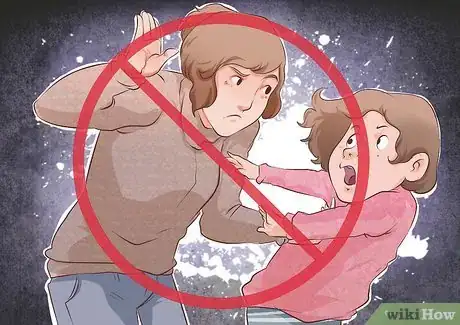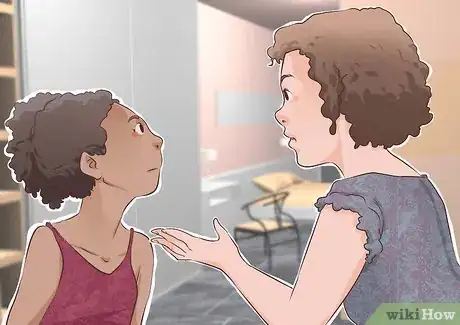This article was co-authored by Supatra Tovar, PsyD, RD. Dr. Supatra Tovar is a Licensed Clinical Psychologist (PSY #31949), Registered Dietitian, Fitness Expert, and the Owner of Dr. Supatra Tovar and Associates. Dr. Tovar has worked in the fields of health education, clinical dietetics, and psychology. With over 25 years of holistic wellness experience, she practices Holistic Health Psychotherapy. She combines her psychology, diet, and fitness knowledge to help those struggling with depression, weight gain, eating disorders, life transitions, and relationships. Dr. Tovar holds a BA in Environmental Biology from The University of Colorado Boulder, an MS in Nutrition Science from California State University, Los Angeles, and a PsyD in Clinical Health Psychology from Alliant International University, Los Angeles.
There are 12 references cited in this article, which can be found at the bottom of the page.
This article has been viewed 705,573 times.
Little sis refusing to stop tugging on your shirt or interrupting you? As cute and awesome as your sister may be most of the time, every older sibling has to deal with a little bit of nuisance eventually. And that’s totally natural and normal! Still, it’s reasonable if you want to curb your little sister’s antics, and we’re here to show you how. Read on to learn how you can get your younger sibling to stop bothering you.
Things You Should Know
- Be kind and compassionate. Your little sister is probably just trying to get your attention, so don’t assume she’s being annoying to be mean.
- Express how you feel and kindly ask her to stop pestering you. If she doesn’t stop, get an adult to help you out.
- Treat your sister the way you want to be treated. It’s okay to set boundaries or get some personal space, but don’t lash out.
Steps
Getting Her to Stop
-
1Assume good intentions unless you have evidence otherwise. Always practice kindness and empathy when talking to your little sister. Even if she is bothering you, she is probably doing this because she wants to follow your lead and be a part of your world. Her annoying behavior is very likely just her way of trying to get your attention.[1]
- She’s younger than you are. She doesn’t have your way with words! If she did, she’d probably just tell you she wants to hang out instead of pestering you.
-
2Stay calm so you can express yourself reasonably. Getting angry is probably just going to get you in trouble, and expressing frustration will either give your sister what she wants (if she’s doing this on purpose) or just confuse her (if it’s not on purpose). Keep your cool! Try not to take it personally and realize they are acting out because they have some unmet need.[2]
- If possible, get away from your little sister. Talk to her once you’ve calmed down.
- If you can’t get away, try to keep your head. Blowing up at her will only make things worse. Take a breath and count to 10 before responding.[3]
Advertisement -
3Express your feelings using “I” language. Instead of saying, “You are such a brat!” or, “Why won’t you leave me alone?” try telling her, “When you behave like this, it makes me sad. It hurts my feelings. Do you like it when people hurt your feelings?” This will help her understand the impact of her behavior without making her feel bad.[4]
- Using “I” language rather than blaming, criticizing, or accusing your sister will also show her that you respect her. She will be much more likely to treat you with respect in return.
-
4Listen to your sister's side of the story. How is she experiencing your conflict? Even if you continue to disagree, understanding where she's coming from will help you both move toward a solution. It’s extremely likely she doesn’t even realize she’s annoying you.[5]
- You might ask, “Hey, how do you think you’d feel if I asked you to keep hanging out while you were working on your homework?” or, “Why are you still asking me to come to your room? Are you having trouble or something?”
-
5Remember what it was like to be your sister's age. Were you always totally rational, or did you sometimes do ridiculous or embarrassing things? Do you think you ever annoyed people? Do you remember how it felt when people you loved or looked up to were mean to you? Your sister’s brain is still developing, and she needs patience as she figures out how to interact with others.[6]
- The more empathy you show her, the more she will learn, and the less annoying she will become.
-
6Laugh it off or ignore her if she’s bothering you intentionally. She genuinely wants to spend time with you and show you that she loves you, she’s just choosing to express it in a really funny way right now. You shouldn’t lose your cool anyway, but giving your sister the reaction she wants is just going to incentivize her to keep annoying you.[7]
- Consider the consequences of responding harshly. For example, if you give your sister the silent treatment she will become desperate for your attention, which may make her even more annoying.
- Try to be relatable and approachable. Being mean to your sister will only drive a wedge between you two, and there is a good reason she is following you around and annoying you.[8]
-
7Tell a parent or grown up what’s happening and ask for help. If your sister is getting on your last nerve, reach out to an adult for help. There’s no need to take matters into your own hands if someone else can do it for you.[9]
- Remember, people will be less inclined to help if you get personal, or if you overreact: “She’s so annoying! Make her stop!” or, “You always take her side!”
- Instead, focus on the problem: “She’s come into my room without knocking every day this week, and I feel like I can’t get any privacy. Could you talk to her about it?”
Being a Good Role Model
-
1Act the way you’d want your sister to act. Even though it may not always seem like it, your little sister looks to you as an example of how she should act. If you blow up over small things, pinch her, or raise your voice, she will copy that behavior. By not annoying her, she won’t annoy you![10]
- When you interact with your little sister, ask yourself, “How would I feel or react if she treated me this way?”
- If you mess up and raise your voice in a moment of anger, apologize to her later, when you’ve calmed down. She will learn from your example and may start to return the favor when she messes up.
-
2Include your sister in important things. Your sister shouldn't feel like she's a detached part of the family because she's younger. When planning a party or fun activity, include her whenever you can. She’ll be much more likely to stop pestering you in the future when you ask if she feels like you normally treat her fairly.[11]
- If you include your sister in stuff, she’ll be more comfortable spending time by herself when you eventually need alone time.
-
3Treat her the way you want to be treated. When you are angry, it can be tempting to lash out at your little sister, but it is never okay to hurt someone, even if they hurt you first. Hitting, yelling, shouting, or insulting her won’t change anything. Try to handle your irritation with grace and poise, and always caution towards kindness.[12]
- When you ask her to stop pestering you, you might say, “Hey, you know I love you and I’d really love to hang out, but I’m just kind of busy right now.”
- There’s nothing wrong with saying, “It’s not you or anything, but I need some space.”
-
4Set expectations if she’s hanging out with you. Explain what you want, what will happen if your little sister doesn’t do it, and what will happen if she does. Unlike you, your little sister probably needs some boundary-setting to make sense of what is and isn’t allowed, so don’t leave her in the dark.[13]
- For example, if you’re letting her tag along with you and your friends to the movies, you might say, “Now no talking during the movie, okay? If you talk a lot and interrupt the movie, I won’t bring you to the theatre in the future.”
-
5Follow through with rewards and consequences. If you tell your sister a certain behavior will earn her a certain reward, make sure she gets that reward if she behaves. On the other hand, if you tell her a certain behavior will have a negative consequence, make sure that consequence happens if she doesn’t behave.[14]
- This also means that you should avoid saying things like, “If you don’t leave me alone, I’m never talking to you again!” Your sister knows that you will have to talk to her again at some point, so your threat will be meaningless, and she will have no reason to listen to you.
- If she expects you to lie to her or trick her, she probably won’t listen to what you say.
-
6Walk away from bad behavior. Saying, “If you need to be upset for a while, that’s okay, but I can’t talk to you while you’re like this,” and then calmly disengaging yourself, can be far more powerful than yelling and screaming at your little sister to leave you alone.[15] It may lead to a tantrum at first—your sister is desperate for your attention, and being annoying is one of the easiest ways to get it.
- Don’t leave your sister alone and unsupervised if she is very small, but don’t try to calm her down or reason with her while she is kicking and screaming. Negative attention is still attention, and if you respond to her tantrums by engaging with her, she will learn that throwing tantrums is a good way to get you to interact with her.
- Once she's calmed down, be ready to re-engage.
-
7Remember that in the end, you aren't your sister's parent. As an older sibling, you are a valuable role model and teacher. Establishing strong expectations and following through on what you've said are important ways to exercise these responsibilities. However, you aren’t your sister’s parent, so don’t try to solve things you have no control over.[16]
- Ultimately your parent or guardian is responsible for guiding your sibling's behavior. If you need help, reach out to them first to see if they can provide the support you need.
Being Kind to Yourself
-
1Use controlled breathing exercises to calm down and center yourself. Inhale slowly through your nose for about 4 seconds, hold your breath for about 2 seconds, and then exhale slowly for another 4 seconds. Pause for a couple of seconds and repeat. This will work best if you are breathing from your diaphragm—this means that your stomach should inflate when you inhale, rather than your chest.[17]
- Concentrating on your breathing is a tool many psychologists use to help teach people to manage anxiety and frustration.
-
2Get plenty of sleep and eat a healthy diet. You have probably noticed that you tend to be crankier when you are tired or hungry. Taking care of your body will help you stay sane when your little sister starts annoying you.[18]
- The better you feel, the less likely you’ll be to act out when something bothers you.
-
3Keep things in perspective when you get annoyed. Remember that a big part of what makes your sister annoying is that she is still little. While it may feel like she’s always going to make you angry, it may help to remember that she is growing and learning every day. She won’t always be this aggravating. Remind yourself that you love her and that this moment won’t feel very important in another week or so.[19]
- Try to recall the many positive aspects of having a sibling. You and your sister will always have each other. It's highly likely that the person you find so annoying at this stage in your life will grow into a lifelong friend.
- Make a list of kind, helpful, or loving things your little sister has done for you. Keep it for future reference to remind yourself of her good qualities when she bothers you.
-
4Create some personal space. While giving your sister the silent treatment will only make matters worse, you'll be a lot happier if you can subtly create some time for yourself. Visit a friend, go for a walk, spend some time doing something you love, or sit in your room with your headphones on for a while to recharge your batteries.[20]
Community Q&A
-
QuestionWhy do little sisters always follow you?
 wikiHow Staff EditorThis answer was written by one of our trained team of researchers who validated it for accuracy and comprehensiveness.
wikiHow Staff EditorThis answer was written by one of our trained team of researchers who validated it for accuracy and comprehensiveness.
Staff Answer wikiHow Staff EditorStaff AnswerThey think you're cool! As annoying as this might be, it's almost always a sign that they just want your attention because they like you. Try to be flattered by it.
wikiHow Staff EditorStaff AnswerThey think you're cool! As annoying as this might be, it's almost always a sign that they just want your attention because they like you. Try to be flattered by it. -
QuestionMy little sister can be quite aggressive, even on the little things. Is it because of me?
 wikiHow Staff EditorThis answer was written by one of our trained team of researchers who validated it for accuracy and comprehensiveness.
wikiHow Staff EditorThis answer was written by one of our trained team of researchers who validated it for accuracy and comprehensiveness.
Staff Answer wikiHow Staff EditorStaff AnswerNo, not at all. Part of growing up is testing the limits and learning how to react when you're emotional. Your little sister is still developing as a person, so don't take it personally. She'll cool off as she gets older.
wikiHow Staff EditorStaff AnswerNo, not at all. Part of growing up is testing the limits and learning how to react when you're emotional. Your little sister is still developing as a person, so don't take it personally. She'll cool off as she gets older.
References
- ↑ Supatra Tovar, PsyD, RD. Licensed Clinical Psychologist (PSY #31949), Registered Dietitian, & Fitness Expert. Expert Interview. 6 October 2021.
- ↑ Supatra Tovar, PsyD, RD. Licensed Clinical Psychologist (PSY #31949), Registered Dietitian, & Fitness Expert. Expert Interview. 6 October 2021.
- ↑ https://www.nhsinform.scot/healthy-living/mental-wellbeing/anger-management/how-to-control-your-anger
- ↑ https://www.ncbi.nlm.nih.gov/pmc/articles/PMC5961625/
- ↑ Rebecca Kason, PsyD. Licensed Clinical Psychologist. Expert Interview. 12 August 2021.
- ↑ https://www.helpguide.org/articles/mental-health/improving-family-relationships-with-emotional-intelligence.htm
- ↑ Rebecca Kason, PsyD. Licensed Clinical Psychologist. Expert Interview. 12 August 2021.
- ↑ Supatra Tovar, PsyD, RD. Licensed Clinical Psychologist (PSY #31949), Registered Dietitian, & Fitness Expert. Expert Interview. 6 October 2021.
- ↑ https://childmind.org/article/teaching-kids-boundaries-empathy/
- ↑ Supatra Tovar, PsyD, RD. Licensed Clinical Psychologist (PSY #31949), Registered Dietitian, & Fitness Expert. Expert Interview. 6 October 2021.
- ↑ https://macleans.ca/society/life/on-toxic-siblings-and-why-its-not-your-fault-you-cant-stand-your-brother/
- ↑ Supatra Tovar, PsyD, RD. Licensed Clinical Psychologist (PSY #31949), Registered Dietitian, & Fitness Expert. Expert Interview. 6 October 2021.
- ↑ https://psychcentral.com/relationships/the-importance-of-personal-boundaries
- ↑ https://psychcentral.com/relationships/the-importance-of-personal-boundaries
- ↑ https://www.psychologytoday.com/blog/wander-woman/201308/how-deal-annoying-people
- ↑ https://www.theatlantic.com/family/archive/2019/01/how-do-i-help-my-anxious-sibling/580195/
- ↑ http://www.anxietybc.com/sites/default/files/CalmBreathing.pdf
- ↑ https://www.psychologytoday.com/blog/wander-woman/201308/how-deal-annoying-people
- ↑ https://www.psychologytoday.com/blog/wander-woman/201308/how-deal-annoying-people
- ↑ https://www.psychologytoday.com/us/blog/fulfillment-any-age/201904/5-things-you-need-know-about-personal-space
About This Article
The best way to stop your little sister from annoying you is to just tell her how it makes you feel. For example, you could say, “It hurts my feelings when you poke me. Please stop.” Alternatively, try removing yourself from the situation by going to another room or going outside so you have time to calm down. Keep in mind that siblings sometimes annoy each other when they aren’t getting enough attention, so try to put aside a little time each week to spend time with her. However, if she doesn’t stop the bad behavior, ask your parent or caretaker for help. To learn how to help set family rules, read on!














































































